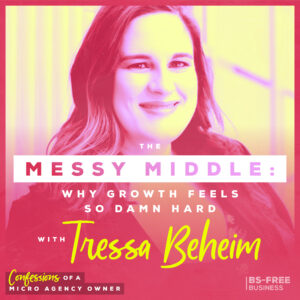
Search the site:
The Done-For-You Dilemma: Making Consulting Work for Your Agency
You’ve probably heard it a thousand times: if you want to grow your agency, you must double down on done-for-you services. Productize, hire a team, build SOPs, and boom—freedom and flexibility await.
Except… that’s not how it plays out for most micro agency owners.
Instead, you manage the people doing the work, review deliverables at 10 p.m., and are stuck in more meetings than you ever had in your 9-to-5. When you finally look up from the whirlwind, you realize you didn’t build a business—you built a full-time job with extra stress. What if I told you that the story you’ve been sold about DFY being the only way to grow isn’t just flawed—it’s downright limiting?
In today’s episode, we’re busting the myth that you have to choose between being a consultant or running a done-for-you agency. Because, spoiler alert: you can—and should—do both. And when you do, your micro agency becomes smarter, more profitable, and much more fun to run.
Let’s start with the story you’ve probably been told or the one you’ve built your agency around: You need to sell DFY services to grow an agency. Period.
The logic sounds good because:
- Done-for-you is scalable.
- It’s easier to systematize.
- It gets your team delivering, so you’re not “in the weeds.”
- And if you build the right SOPs, you’ll be free to work on the business, not in it.
You might’ve even been told that if you’re still doing any client-facing work, you’re doing it wrong. But here’s what really happens for most micro agency owners:
- You hire a few contractors or employees, and suddenly you’re managing people problems, not just projects.
- The team still needs your eyes on everything.
- Clients want access to you, not your junior strategist or VA.
- Your calendar fills up with meetings, approvals, and troubleshooting—not CEO-level work.
What started as a business that was supposed to give you freedom and flexibility now feels like you’ve recreated the 9-to-5 you left behind.
When DFY is your only revenue stream, your only way to grow is to take on more work. This means more clients, more people to manage, and more pressure.
Why This Advice Doesn’t Work for Micro Agencies
Let me be super clear: I’m not anti-DFY. My micro agency still offers DFY services.
But I am anti-BS advice that doesn’t account for the reality of running a lean business. Most of the agency advice out there comes from:
- People with teams of 20+ and the overhead to match.
- Online business bros and babes who’ve never run a legit, non-scammy agency.
And this advice assumes you’ve got:
- Multiple layers of staff to delegate to.
- A full-time operations manager or PM.
- The desire to build something big
But if you’re listening to this podcast, I’m willing to bet that’s not you.
You’re running a micro agency, so it’s you and a small team. You care deeply about your clients and your craft.
You want to grow, yes, but not at the expense of your sanity.
And the “just delegate more” advice falls apart fast when you don’t have layers of management between you and the work.
The Power of Consulting
Here’s the pivot: What if you didn’t have to choose between working 60 hours a week or hiring a dozen people?
What if you could grow by selling your brain, not just your team’s bandwidth?
That’s where consulting comes in. Consulting sometimes gets a bad rap in the agency world because people assume:
- It’s just for coaches.
- It’s not “real” work.
- It’s hard to sell.
- It doesn’t scale.
Let me call BS on all of that. Consulting is work. Its strategy work is of high value. It’s what your clients need before hiring someone to do the execution.
Keep in mind that consulting is NOT coaching. You’re not hand-holding someone through their feelings. You’re guiding clients to make better decisions, solve real business problems, and avoid costly mistakes.
Most of all, consulting is sellable. It’s probably something you’ve already been doing—unpaid. If you’ve ever:
- Presented a content strategy.
- Audited a funnel.
- Helped a client pick the right tools or approach.
- Jumped on a call to “talk through something”.
You’re already doing consulting but may not charge appropriately for it.
Stop burying your consulting and strategy work inside your DFY services. That expertise is high-value on its own it can be more profitable, require fewer team members, and eliminate the mess of managing deliverables and timelines.
How to Layer Consulting into a Micro Agency
Let’s get practical. How do you add consulting to your existing business?
You don’t have to blow up your entire micro agency. You can layer in consulting strategically, starting with just one offer.
Here are four options:
Option #1: Strategy Intensive
Strategy intensives are one-time consulting engagements designed to help clients gain clarity, make decisions, and walk away with a solid plan. (You may have heard me talk about Sell the Strategy, which is precisely what this is!)
These can take many forms: a 90-minute session, a full-day strategy sprint, or a short series of calls.
You might use them to develop brand messaging, map out a launch, create an email marketing strategy, or optimize a customer journey.
The deliverables are focused and actionable, such as a strategic plan, a roadmap, or a prioritized list of next steps.
This offer works particularly well because it’s quick, high-impact, and gives clients a high-touch experience without a long-term commitment. It’s also a smart entry point into deeper consulting or future DFY work.
Option #2: Fractional Retainers
Fractional retainers position you as a part-time strategist or advisor for your client’s business. You’re not responsible for execution—instead, you provide ongoing strategic guidance through regular check-ins, reviews, and leadership support.
Consider roles like a fractional CMO, Director of Operations, or Content Strategy Lead. This model is ideal for clients who need consistent high-level input but aren’t ready—or willing—to bring on a full-time hire. It lets you stay involved meaningfully without getting pulled into the day-to-day delivery.
Option #3: Team Advisory
With this type of consulting, you step into the role of advisor and guide rather than implementer. Instead of your micro agency handling execution, you work alongside your client’s internal team or freelancers to ensure they’re headed in the right direction.
Your role is to provide strategic oversight, offer feedback, ensure the work meets quality standards, and help resolve issues as they arise.
This model is especially valuable for larger clients who have the people to get things done but lack the leadership or deep expertise to execute them well.
It’s a smart way to stay involved in high-impact work without taking on the full delivery load, and it positions you as an essential partner in driving the big picture forward.
Option #4: Hybrid Packages
Hybrid packages combine the best of your consulting and done-for-you work, allowing your team to show up as a strategic leader and implementer without being responsible for everything.
You might start with a strategy engagement to lay the groundwork and then move into DFY execution based on that plan.
Or, you could embed monthly strategy sessions into an ongoing retainer, giving clients access to your brain and your team’s skills. This approach strengthens your role as a trusted partner, aligns expectations from the start, and ensures that the work is grounded in a well-defined strategy.
From Second-Guessing to Strategic Moves
Even if you’re nodding along so far, I know there’s probably a little voice in your head going, “Yeah, but…” That hesitation? Normal!
When you’ve built your micro agency around mostly done-for-you work, adding consulting can feel like a big shift, even if it’s the right one.
You might wonder if your clients will go for it, if you have what it takes to sell it, or if it will throw your whole positioning into chaos.
So, before we get too far, let’s tackle the top three objections I hear from micro agency owners when I bring up consulting.
“Clients won’t pay for consulting.”
They will—if you position it right. You’re not selling a vague “pick my brain” session. You’re selling clarity, direction, and results. The same clients who question your $5k audit will happily pay $10k for a thoughtful plan that saves them six months of chaos.
“I don’t know how to structure it.”
Start simple. A 90-minute intensive. A three-call strategy sprint. A monthly check-in. You don’t need a big curriculum or a 42-page workbook. You just need a defined outcome and a price.
“This will confuse our positioning.”
Only if you present it like an afterthought. Instead, position consulting as a premium service, something experienced clients graduate to. It’s not a downgrade. It’s a power-up.
While DFY is a powerful offer, it doesn’t have to be your only offer.
Consulting gives you a way to:
- Work more strategically.
- Serve higher-level clients.
- Make more money with fewer deliverables.
- Protect your calendar and your sanity.
You don’t have to pivot overnight. But you can start testing the waters. Offer a strategy session to a past client. Bundle a consulting call into your proposal. Run a pilot with a struggling client who could use more direction.
You don’t need to be a coach. You just need to be willing to own your expertise and finally charge for it.
Consulting Isn’t a Pivot, It’s a Power-Up
So much of the agency world wants to put us in a box: you’re doing done-for-you work or a consultant. But that binary thinking doesn’t reflect the reality of running a micro agency.
You don’t have to choose one lane forever. You can build a micro agency that blends strategy and execution in a way that works for you. Consulting isn’t a downgrade, and it’s not some radical pivot. It’s a powerful addition that gives you leverage without needing to grow a giant team or pack your calendar with projects.
Consulting could be the unlock if you’re feeling stretched thin or starting to resent the delivery side of your business. It lets you lead instead of chase deadlines, earn more without adding complexity, and serve clients in a deeper, more sustainable way.
Instead of asking, “Should I do DFY or consulting?” ask, “How can I make space for both?”

I’m Maggie Patterson (she/her), and services businesses are my business.
I have 20+ years of experience with client services, am a consultant for agency owners, creatives, and consultants, and vocal advocate for humane business practices rooted in empathy, respect, and trust.
Read or Listen to the Latest
For Solo Business Owners

Growing a solo service business is tough.
It’s even harder when you’re bombarded with BS advice that steers you away from your values and why you started your business in the first place.
This is the podcast for solo creatives and consultants who want to remain as a team of one and have zero interest in the hustle and grind of typical business teachings.
Subscribe now and never miss an episode.
For Micro Agency Owners
Most podcasts for agency owners obsess over revenue growth as the ultimate success metric.

But here’s the truth: not everyone wants to make millions. Your goal might be to build a sustainable business that lets you have a life and doesn’t run you into the ground.
Join me as I spill my shameless confessions and share everything I’ve learned about building a micro agency that skips the BS of tired and typical agency teachings.
Follow Now on All Major Podcast Platforms







